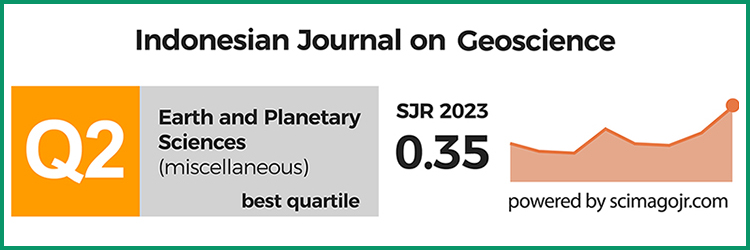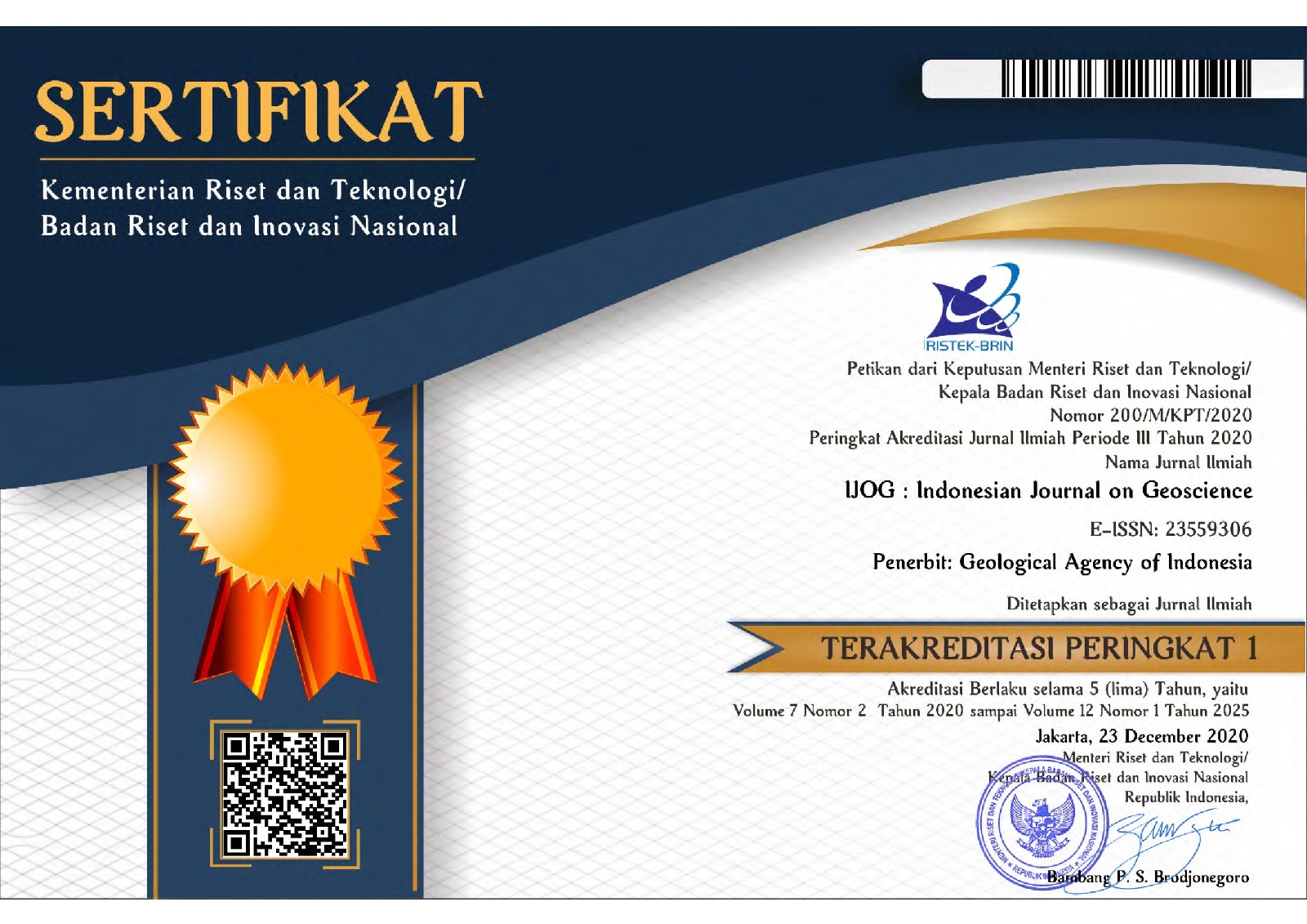Nannofossil Distribution and Age of Kendeng Zone In Kalibeng River Section of Kedungringin, Plandaan Area, Jombang, East Java
DOI:
https://doi.org/10.17014/ijog.7.1.15-24Abstract
DOI:10.17014/ijog.7.1.15-24
This study was carried out at Kalibeng River Section, in Kedungringin area, a site with lithology suitable for a nannoplankton research. Methods used in this research include performing a stratigraphical measurement section at the field, collecting thirty-two samples, and preparing the samples with the smear slide method using a polarizing microscope with 1000x magnification, and preparing several rock samples using SEM analysis. The analysis of nannofossil resulted in twelve genera and forty-three species. The identified genera are: Calcidiscus, Coccolithus, Ceratolithus, Discoaster, Gephyrocapsa, Helicosphaera, Pseudoemiliania, Reticulofenestra, Rhabdosphaera, Sphenolithus, Syracosphaera, and Umbilicosphaera. The presence of these genera indicates that Kalibeng River Section have abundant nannofossils and based on the nannofossil analysis, from older to younger, the studied stratigraphic sequence indicates a more detailed age determination as follows: the Marl Unit of Kalibeng is NN10-NN18 (Middle Miocene to Pliocene), Calcareous Sandstone Unit of Sonde is NN19-NN20 (Pliocene-Pleistocene), and Calcareous Claystone Unit of Sonde is NN20-NN21 (Pleistocene).
References
Aubry, M-P., 1985. Northwestern European Paleogene magnetostratigraphy, biostratigraphy and paleogeography: calcareous nannofosil evidence. Geology, 13 (3), p.198-202.
Berghuis, H.W.K., Troelstra, S.R., and Zaim, Y., 2019. Biostratigraphy of the Eastern Kendeng Zone (Java, Indonesia): The Marmoyo and Sumberingin Sections. Journal of Palaeogeography, Palaeoclimatology, Palaeoecology, 528, p. 218-231. DOI: 10.1016/j.palaeo.2019.05.008
Choiriah, S.U., Kapid, R., and Rahardjo, W., 2001. The Pliocene/Pleistocene Boundary, Based On Calcareous Nannofossils, And Related Palaeoclimatic Implications, Solo River Section, Ngawi Region, East Java, Indonesia. Journal of Nannoplankton Research London,.23,1, p.15-19.
URL: ina.tmsoc.org/JNR/online/23/Choiriah%2 20et%20al%202001%20JNR%20231.pdf.
Lunt, P., 2019. The origin of the East Java Sea basins deduced from sequence stratigraphy. Journal of Marine and Petroleum Geology, 105, p. 17-31. DOI: 10.1016/j.marpetgeo. 2019.03.0 38.
Martini, E., 1971. Standard Tertiary and Quaternary calcareous Nannoplankton biozonation. In: Bilal, U.H., 1984 (ed.), Nannofossils Biostratigraphy Part III:12., Cenozoic Biostratigraphy, Hutchinson Ross Publishing Company, Stroudsburg, Pensylvanian. p.264-307.
Okada, H. and Bukry, D., 1980. Supplementary Modification and Introuction of Code Number to the Low-Latitude Coccolith Biostratigraphic Zonation (Bukry, 1973; 1975). Marine Micropaleontology, 5 (3), p.321-325. DOI:10.1016/0377-8398(80)90016-x
Perch-Nielsen, K. and Nielsen., 1985. Cenozoic calcareous nannoplankton, Chapter 10. In: Bolli, H.M., Saunders, J.B., and Perch-Nielsen, K. (eds.), Plankton Stratigraphy, Cambridge Earth Science Series, Cambridge Univ. Press, Cambridge, p.427-554. DOI:10.1017/s0016756800035214
Pringgoprawiro, H., 1983. Biostratigrafi dan palaeogeografi Cekungan Jawa Timur Utara pendekatan baru, Disertasi Doktor Teknik Geologi, ITB, 239pp.
Van Gorsel, J.T., Lunt, P., and Morley, R., 2014. Introduction to Cenozoic biostratigraphy of Indonesia, SE Asia, Biostratigraphy of Southeast Asia Part 1. Indonesian Journal of Sedimentary Geology, 29 (4) p.6-40.



















